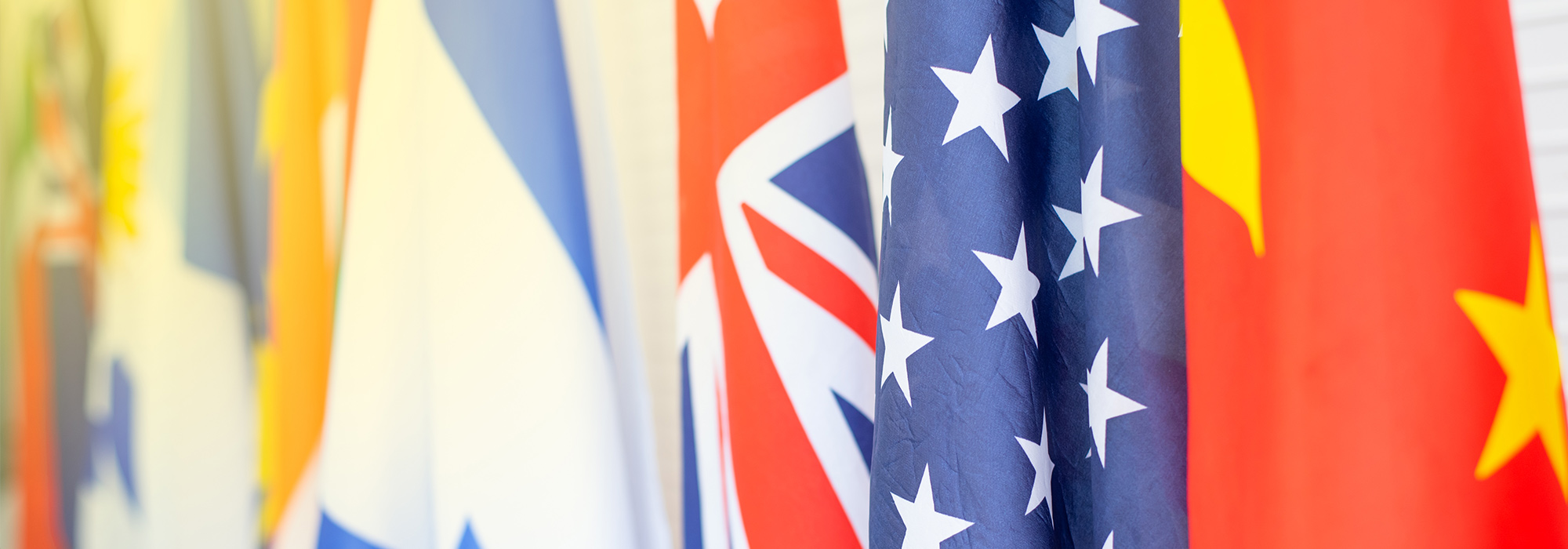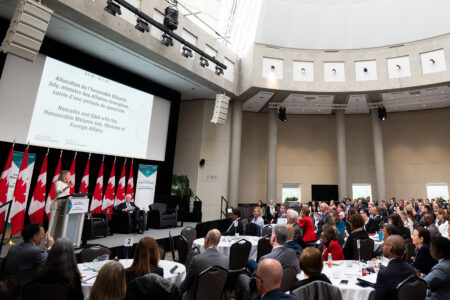
The world has experienced greater change in the past thirty years than it did in the previous three hundred. What we are all struggling to find is the one big idea that explains what we feel. I believe that the concept of “the great convergence” explains the massive change we are experiencing. Since human history began, we have lived in different communities and tribes and in different cultures and civilizations. Today, the massive forces unleashed by globalization are creating a new global civilization. Until recently, terms like “North and South” and “developed and developing” were used to describe the global condition. Today, the terms appear irrelevant…
I can speak with great passion and conviction about this massive change in the human condition as I have experienced it personally. As a child in Singapore in the 1950s and 1960s, I lived in a typical Third World city. Our per capita income was the same as Ghana’s. We had no flush toilets, some malnutrition, ethnic riots, and, most importantly of all, no sense of hope for the future. Singapore was then a British colony. No one believed that Singapore could become as prosperous as London. Yet the unthinkable happened. Now this “impossible” feat is being replicated in all corners of the world. We are building a new and better civilization.
The global policy community proposes to sail into the uncertain waters of the twenty-first century without a captain.
And we are also creating one world. Never before in history has humanity been so interconnected and interdependent. When Greece totters, Europeans are not the only ones who worry. Barack Obama knew in his guts that Greece could derail his reelection. And stock markets from Latin America to Asia, Africa to Australia also fell. Greece was a tiny domino. But it could bring down larger dominoes because we have become fundamentally intertwined. Yet despite this, we still do not have the right conceptual structures to capture this new global condition.
The nation-state was invented in 1648 with the Treaty of Westphalia. And it has served humanity reasonably well as an organizing concept, overcoming the old divisions of tribes and sects, clans and classes. But it is hard to believe that a human construct invented more than three hundred fifty years ago can serve humanity when everything has changed so totally. A simple analogy will explain this fundamental change. Before the era of modern globalization, when humanity lived discretely in more than one hundred separate countries, humankind was like a flotilla of more than one hundred separate boats. What the world then needed was a set of rules designed to ensure that these many boats did not collide and to facilitate their cooperation on the high seas if they chose to do so. This is what the 1945 rules-based order strived to do, and despite some obvious failures, it succeeded in producing a relatively stable global order for more than fifty years.
Today, global circumstances have changed dramatically. The 7 billion people who inhabit planet earth no longer live in more than one hundred separate boats. Instead, they all live in 193 separate cabins on the same boat. But this boat has a problem. It has 193 captains and crews, each claiming exclusive responsibility for one cabin. However, it has no captain or crew to take care of the boat as a whole. None of us would sail into an ocean of rapidly changing currents and looming storms without a capable captain and crew at the helm of our boat. Yet the global policy community proposes to do exactly that: sail into the uncertain waters of the twenty-first century without a captain.
Many of the major global challenges we face demonstrate well the degree to which all 7 billion of us sail on the same boat. The global financial crisis of 2008-2009 began with the collapse of Lehman Brothers in September 2008. Yet within months, the entire global economy came crashing down. No country could detach itself from this crisis because we were all in the same boat. The world came close to a total global economic meltdown in January 2009. Yet, amazingly, few people are aware that total meltdown was averted only because a captain and crew emerged in time to take care of the boat as a whole.
It happened at a G-20 leaders meeting in London. Traditionally, all G-20 leaders are programmed to put the interests of their cabins ahead of the interests of the boat as a whole. This is natural behavior. They are elected by their cabins, not by the boat as a whole. Yet when they came to London on April 2, 2009, they clearly sensed that the boat was sinking. To save their own cabins, they had to save the boat. Hence, they mounted a major coordinated global exercise to bring the world economy back from the brink. They pooled all their resources and decided to stimulate the global economy with US$1.1 trillion. For all practical purposes, even though the G-20 leaders will deny this emphatically, the G-20 meeting functioned like a global government — and it performed well.
Common sense would dictate that if all 7 billion people now live on the same boat, we should elect or select a captain and crew to take care of the boat as a whole. We have to create a global government of some sort, but not even the boldest political leaders want to mention the words “global government.” It is out of reach as a practical idea; the world’s electorates are not ready for it. Still, there are times when we will need it. For the next century or more, the world will have to live with a slew of imperfect solutions for solving major and growing global challenges. Imperfect solutions can solve some global problems. In the late 1970s and 1980s, the realization that there was an ever-expanding ozone hole, created by man-made chemicals called chlorofluorocarbons (CFCs), spurred concerted action. Good sense prevailed, and in 1987 forty-three nations came together to sign and ratify the Montreal Protocol, which aimed to phase out the production and use of CFCs. A decade or two later, the problem disappeared. The Montreal Protocol worked…
Let me emphasize one key point: convergence also creates complexity. In this new world of ours, no one can claim to be a world leader or world thinker if he or she fails to understand the major global contradictions of our time. Nor can he or she make a significant difference to improve our global order without working out how to make complex trade-offs among these global contradictions.
Paradoxically, the contemporary Western mind, which has until recently been more open than other minds, may have more difficulty grasping this complexity. Through a tangled combination of having to be always politically correct and never admitting to Machiavellian calculations, most Western commentators have fallen into a black-and-white mind-set. In their minds, there are right or wrong solutions. In the real world, most solutions are right and wrong solutions wrapped together.
Through a tangled combination of having to be always politically correct and never admitting to Machiavellian calculations, most Western commentators have fallen into a black-and-white mind-set.
Let me illustrate this point with a controversial example. Most Chinese intellectuals I speak to are genuinely convinced that Mao Zedong did more good than harm for China. It is conventionally said in China that Mao was 70 percent right and 30 percent wrong. Most Western intellectuals find this judgment to be inconceivable. Yet most Asians find this Chinese judgment to be perfectly conceivable because Mao inherited a China that had been almost completely broken after having been trampled and humiliated by several major powers. He inherited a broken nation and made it stand tall. It is true that he made horrible mistakes toward the end of his rule, especially with the Great Leap Forward and Cultural Revolution. His rule is believed to have caused the deaths of 40 to 70 million people. But if Mao had not picked up the mighty nation and made it stand tall, China would have been far worse off. Mao brought about many positive changes. These included promoting the status of women, improving popular literacy, doubling the school population, providing universal housing, abolishing unemployment and inflation, increasing access to health care, and raising life expectancy significantly. In fact, China’s population almost doubled during the period of Mao’s leadership, from around 550 to more than 900 million. Several Chinese intellectuals have also told me that Deng could not have lifted China to greater heights without the platform of national unity he had inherited from Mao.
Equally importantly, even after Mao made his famous statement in 1949 that “the Chinese people have stood up!,” he faced two great geopolitical challenges. First, he had to fight a massive war against the vastly superior American forces in the Korean Peninsula in 1950–1951. Second, he found himself in an equally dangerous confrontation with the world’s second-most powerful superpower, the Soviet Union. In 1969, there were major direct military clashes between Chinese and Soviet military forces at the Sino-Soviet border near the Ussuri River. These clashes could have easily escalated. Mao was acutely aware that the Soviet Union was capable of using nuclear weapons against China. Mao did not blink. Instead, he always took advantage of the prevailing “contradictions” of his time to steer China into safe waters. It is possible that only a leader like Mao with his extraordinary strategic gumption and skills could have succeeded in steering China through these great challenges.
The era of strong leaders like Mao is over. The grain of human history has changed irrevocably, and we probably will never see again such dominant rulers like him. But the era of global contradictions is not over. Instead, as this chapter has tried to document, there will be more, rather than fewer, global contradictions. Victory in any sphere will go to those who master and use these global contradictions rather than opposing them. And to succeed in a world of so many contradictions, all nations will have to make complex trade-offs.
Let me take another provocative example. To put the dilemma for the West plainly and simply, as the relative power of the Western world continues to recede steadily in the twenty-first century, Western leaders will have to learn once again to be careful and pragmatic in their foreign policies. Black-and-white postures will have to be replaced with nuanced policies. In this regard, the best test case for the West to demonstrate a capacity to master complexity would be to begin a thought experiment with the Iranian challenge. Can the West conceive of the possibility that the best way to engender change in Iran is to slip Iran into the story of the great convergence that this book has been documenting? China is a different China today because millions of Chinese have studied in Western universities. Would Iran also change if millions of Iranians were admitted into Western universities? Can a nation like Iran ignore the logic of the great convergence of the world if it is plunged into this global maelstrom of human history?
The tragedy of our contemporary world is that the dominant Western discourse is still incapable of mastering such intricacy. When the military regime of Myanmar suddenly and inexplicably opened up in 2011 and released Aung San Suu Kyi from twenty-one years of house arrest and various other forms of harassment, the West celebrated and embraced her enthusiastically in her moment of celebration. She fully deserved this embrace. But to keep the Myanmar experiment of openness going, it was equally important to open doors to those military leaders who showed courage in releasing Aung San Suu Kyi. Of course, this would have been politically incorrect. And because it was politically incorrect, no Western leader invited President Gen Thein Sein to visit. And in so doing, Western leaders demonstrated that they remain victims of a black-and-white mindset that will prove to be a huge competitive liability as we sail into a world of complex geopolitical contradictions.
This excerpt is taken from The Great Convergence: Asia, the West, and the Logic of One World (New York, NY: Public Affairs Books, 2013).
Photo: SritanaN / Shutterstock






